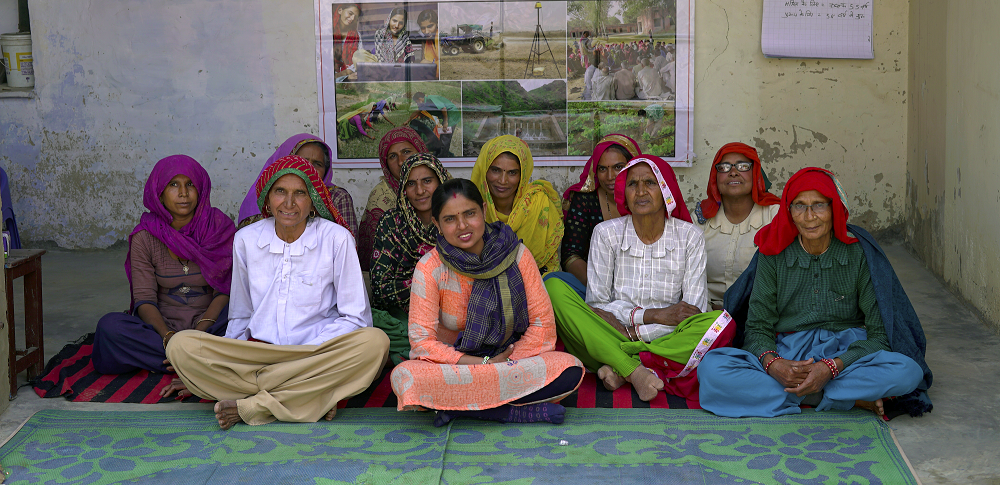
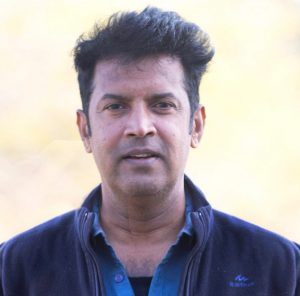
Gender equity is one of the most important prerequisites for a more economically prosperous, equitable and sustainable world. The UN SDG 5 for Gender Equality outlines some ambitious targets for gender equality, especially in the developing world; however, much remains to be done. According to Niti Aayog, women account for almost 50 per cent of India’s population, yet they barely represent 30 per cent of the workforce. The divide is even more blatant when one looks at rural women in agriculture who represent 85 per cent of the workforce, but only 13 per cent of them are agricultural landholders, as highlighted by Oxfam. In the past few years, this subject has been under greater scrutiny and various government initiatives and engagements such as “Beti Bachao, Beti Padhao” have contributed significantly to building the momentum for action.
As per Oxfam, 60-80 per cent of food is grown by women. And yet, their work remains largely unpaid. In our Water, Agriculture and Livelihood (WAL) programme, we take a gender-contextual approach to create resilient communities; actioned into two main objectives. The first one focuses on enabling increased participation and ownership for women in agriculture and allied activities.
That being said, corporate India needs to step up to the cause with a strategic vision and purpose to centralise women and gender empowerment across the social impact space. At Pernod Ricard India, we envision transforming our communities and accelerating local development near our plants and in areas of national priorities. Within our larger community transformation purpose, we believe that supporting women and all genders across all sectors is essential to unleashing the next wave of growth and development for the country. With various programmes across 19 States, our projects take a holistic approach and work with more than 1,25,000 rural women, girl children and women social entrepreneurs to encourage access to better education, social entrepreneurship, and ownership in agri-livelihood activities.
Empowering Rural Women to Step Beyond the Four Walls
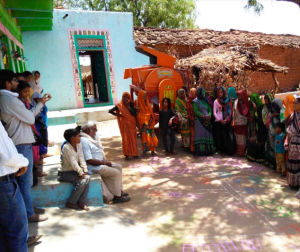 As per Oxfam, 60-80 per cent of food is grown by women. And yet, their work remains largely unpaid. In our Water, Agriculture and Livelihood (WAL) programme, we take a gender-contextual approach to create resilient communities; actioned into two main objectives. The first one focuses on enabling increased participation and ownership for women in agriculture and allied activities.
As per Oxfam, 60-80 per cent of food is grown by women. And yet, their work remains largely unpaid. In our Water, Agriculture and Livelihood (WAL) programme, we take a gender-contextual approach to create resilient communities; actioned into two main objectives. The first one focuses on enabling increased participation and ownership for women in agriculture and allied activities.
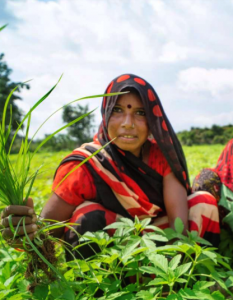 This involves collectivising women as Women Producer Groups (WPGs) or Self-Help Groups (SHGs) to transform local value chains or start micro-enterprises. For example, in Shivpuri, Madhya Pradesh, we are engaging with more than 2,300 women farmers under 100+ WPGs, where women have revolutionised the local groundnut and palash value chain with end-to-end control. With this activity, those women have been able to generate revenue of over Rs 29 Lakhs and almost Rs 80,000 profit per WPG.
This involves collectivising women as Women Producer Groups (WPGs) or Self-Help Groups (SHGs) to transform local value chains or start micro-enterprises. For example, in Shivpuri, Madhya Pradesh, we are engaging with more than 2,300 women farmers under 100+ WPGs, where women have revolutionised the local groundnut and palash value chain with end-to-end control. With this activity, those women have been able to generate revenue of over Rs 29 Lakhs and almost Rs 80,000 profit per WPG.
The programme is also augmenting their disposable incomes to aid a better quality of life. We have supported over 400 women to create nano-horticulture and vegetable plots. Throughout those activities, increased participation and active decision-making ownership from women beneficiaries have been observed while also generating additional income for them and their families.
Key Numbers
|
Championing Change
Bati Adivasi
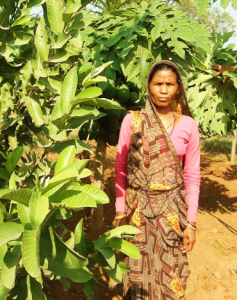 As a small landholding farmer, Bati struggled with growing crops, weak market linkages and an unstable disposable income. Having lost her husband, she had – apart from caring for her land – to take care of her two sons and daughter by herself. Through traditional agriculture, Bati was financially struggling, as with uneven land and limited irrigation, she found it difficult to make ends meet to feed her family.
As a small landholding farmer, Bati struggled with growing crops, weak market linkages and an unstable disposable income. Having lost her husband, she had – apart from caring for her land – to take care of her two sons and daughter by herself. Through traditional agriculture, Bati was financially struggling, as with uneven land and limited irrigation, she found it difficult to make ends meet to feed her family.
As part of the WAL programme in Shivpuri, Bati has built up strong competencies in horticulture management. She initially started with 60 Guava plants, followed by 35 Papaya trees. She has made profits out of this new agro-practice with fewer inputs. She is now confident that she can make more profits and lead a comfortable life. This fruiting season, she earned Rs 15,000 from Papayas, and she aims to earn Rs 1,000 from each plant.
Building World-Class Infrastructure and Services for Inclusion
Neighbourhood Water ATMs for Rural Women
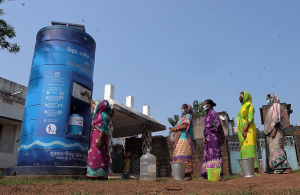 Our Water, Sanitation and Hygiene (WaSH) programme encompasses various facets to minimise drudgery and costs, which disproportionately affect rural women. Our innovative Water ATMs, with their unique “Hub and Spoke” model, serves clean drinking water right in the neighbourhoods of deprived communities, address the gap between the demand and accessibility to potable water, where it is most often women that are expected to bear the cost of transport. On top of that, the model also generates local employment opportunities by employing youth and women SHGs from the communities as machine operators.
Our Water, Sanitation and Hygiene (WaSH) programme encompasses various facets to minimise drudgery and costs, which disproportionately affect rural women. Our innovative Water ATMs, with their unique “Hub and Spoke” model, serves clean drinking water right in the neighbourhoods of deprived communities, address the gap between the demand and accessibility to potable water, where it is most often women that are expected to bear the cost of transport. On top of that, the model also generates local employment opportunities by employing youth and women SHGs from the communities as machine operators.
Key Numbers
|
“People had always been fetching water from tube wells. However, since the installation of the Water ATM, people have happily embraced it. Safe drinking water was a persistent problem earlier. But now, the Water ATM right near our homes has resolved our problems. I have been getting water from here and have asked other people to adopt this practice. We get one litre of water in just 30 paise and can take about 7-8 litres of water, every day, easily. The neighbourhood Water ATM is not only beneficial for us but also extremely affordable and sustainable.” ~ A programme beneficiary at Khurda, Odisha.
In partnership with Sarthak Educational Trust, we aim at working with women with disabilities to create a diverse and inclusive workforce. We have already trained 400+ differently-abled women across 16 States, providing them with a safe and inclusive environment and placing them in competent positions across various sectors.
Safeguarding Menstrual Hygiene at Schools: Enabling the Girl Child to Continue her Education
There exists a wide variety of hardships preventing girl children from pursuing their education – ranging from dire financial family situations to lack of appropriate infrastructures related to menstrual hygiene. We have strived to ensure that students, especially girls, do not face infrastructural obstacles to continuing their education. We have built and renovated 13 schools to date. We have responded to calls for action from the State Governments in Tripura and Arunachal Pradesh to upgrade the menstrual hygiene facilities with free dispensers and incinerators provided at key government schools to ensure that no girl student stops coming to school.
Key Numbers
|
Providing Quality Primary Healthcare Services at the Doorstep of Rural Women
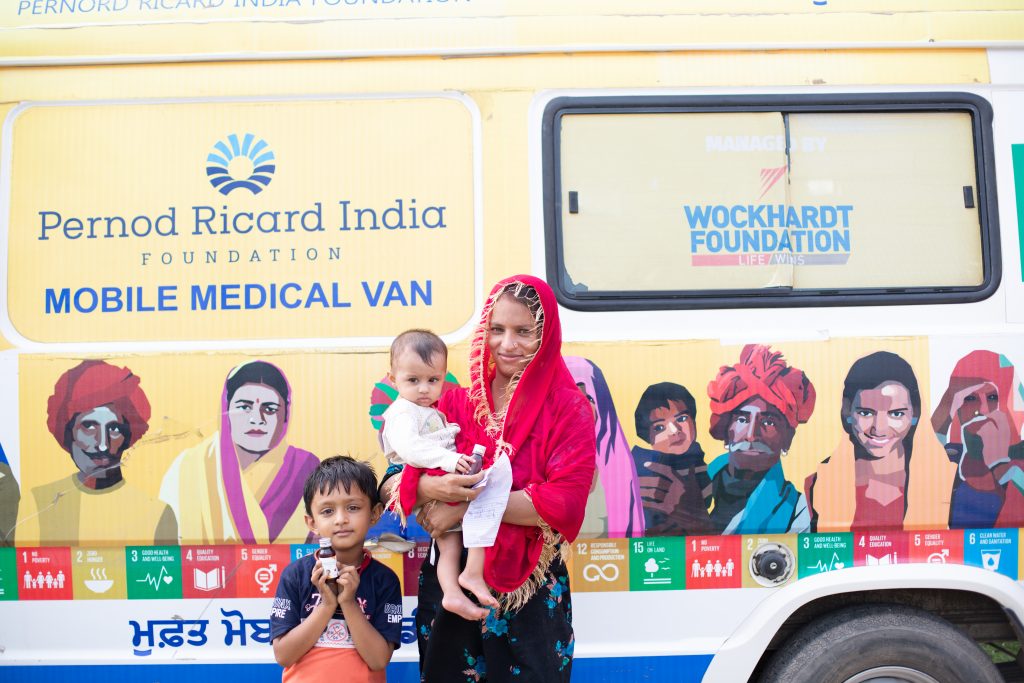 With Project Sanjeevani, we also address the lack of access to healthcare, emphasising preventive measures towards women, children, and the elderly most often left behind due to lack of mobility and affordability. The Mobile Medical Vans provides free doorstep preventive healthcare services. It has also led to awareness campaigns on different issues generally considered taboo – from reproductive, sexual and maternal health to preventing UTIs/STDs.
With Project Sanjeevani, we also address the lack of access to healthcare, emphasising preventive measures towards women, children, and the elderly most often left behind due to lack of mobility and affordability. The Mobile Medical Vans provides free doorstep preventive healthcare services. It has also led to awareness campaigns on different issues generally considered taboo – from reproductive, sexual and maternal health to preventing UTIs/STDs.
Key Numbers
|
Removing Gender Barriers to Education and Employment
Pinki: Educating the Girl Child in Rural India
 Pinki, our flagship programme to reduce gender disparities in education, aims at providing access to quality education to girl children across India, especially those coming from more vulnerable backgrounds. It offers scholarships to those meritorious students and supports them throughout their journey. To date, the programme has enabled 4,012 girl children across India to continue their education.
Pinki, our flagship programme to reduce gender disparities in education, aims at providing access to quality education to girl children across India, especially those coming from more vulnerable backgrounds. It offers scholarships to those meritorious students and supports them throughout their journey. To date, the programme has enabled 4,012 girl children across India to continue their education.
Key Numbers
|
Fostering Employability for Women with Disabilities
In partnership with Sarthak Educational Trust, we aim at working with women with disabilities to create a diverse and inclusive workforce. We have already trained 400+ differently-abled women across 16 States, providing them with a safe and inclusive environment and placing them in suitable positions across various sectors.
Prathibha’s Story of Change
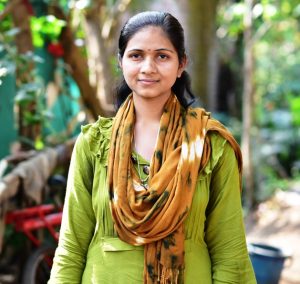 Continuing education has been an uphill battle for Pratibha since she lost her hearing ability in the 7th Grade. With medical expenses related to hearing surgeries taking a toll on her family’s financial condition, her academic career looked bleak. However, Pratibha has been resolute about not letting this become her story, and the PRIF scholarship programme has since then supported her journey. Apart from the financial support, the field team also provides career support and mentorship to keep her dream alive and kicking. Today, all her professors are convinced that she would pass comfortably the Maharashtra Public Service Commission (MPSC) exam.
Continuing education has been an uphill battle for Pratibha since she lost her hearing ability in the 7th Grade. With medical expenses related to hearing surgeries taking a toll on her family’s financial condition, her academic career looked bleak. However, Pratibha has been resolute about not letting this become her story, and the PRIF scholarship programme has since then supported her journey. Apart from the financial support, the field team also provides career support and mentorship to keep her dream alive and kicking. Today, all her professors are convinced that she would pass comfortably the Maharashtra Public Service Commission (MPSC) exam.
Key Numbers
|
With the vision of bridging the gaps between what keeps social enterprises from reaching their true potential and generating tangible social development, we launched the Social Impact Incubator in 2018. The programme works exclusively for women through mentorship, networking, business advisory, incubation and, fellowship support.
Beyond Gender: Creating a Trans-inclusive Workforce
The paradigm of gender equality has seen a sweeping shift in recent years to accommodate the discourse of seeing beyond gender binaries. All our programmes seek to include women as key stakeholders and decision-makers. However, it is our firm resolution to promote women and girls at the forefront and provide an empowering platform for all genders. In 2020, in partnership with Connecting Dreams Foundation, we launched a specialised programme to mainstream and open livelihood opportunities for 100 young and inspiring trans-persons in Delhi NCR.
Valentina: Motivated to Open Her Own Dance Studio
Valentina believes the professional edge course of the Career Progression Fellowship programme has increased her confidence in her abilities and talents. She is determined to take her dance talent forward and aims to do that by opening her dance studio.
Key Numbers
|
Enabling Women Social Entrepreneurs To Do Good
 With the vision of bridging the gaps between what keeps social enterprises from reaching their true potential and generating tangible social development, we launched the Social Impact Incubator in 2018. The programme works exclusively for women through mentorship, networking, business advisory, incubation and, fellowship support. The first incubation centre at the IIM Calcutta focuses on community-centered social impact ideas and solutions exclusively from women entrepreneurs and women-led start-ups. The second one, in partnership with the CIE@IIIT Hyderabad, fosters deep-tech solutions and concepts situated around serving women as the core impact group.
With the vision of bridging the gaps between what keeps social enterprises from reaching their true potential and generating tangible social development, we launched the Social Impact Incubator in 2018. The programme works exclusively for women through mentorship, networking, business advisory, incubation and, fellowship support. The first incubation centre at the IIM Calcutta focuses on community-centered social impact ideas and solutions exclusively from women entrepreneurs and women-led start-ups. The second one, in partnership with the CIE@IIIT Hyderabad, fosters deep-tech solutions and concepts situated around serving women as the core impact group.
Key Numbers
|
Kat Katha’s Journey of Turning the Red Light Area into “Street of Love”
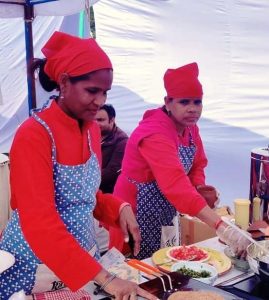 Kat Katha began with the vision of ending forced sex work. Supporting women and children living in red-light districts, they aimed at enabling those people to live a life of their own choice and pursue their dreams with dignity, ownership, and compassion. In almost ten years, they have worked with approximately 1,500 women and more than 300 children living across 85 brothels of GB Road in Delhi.
Kat Katha began with the vision of ending forced sex work. Supporting women and children living in red-light districts, they aimed at enabling those people to live a life of their own choice and pursue their dreams with dignity, ownership, and compassion. In almost ten years, they have worked with approximately 1,500 women and more than 300 children living across 85 brothels of GB Road in Delhi.
Their flagship initiative – Maitri Meals, is being incubated by us. The goal is to provide a platform to offer life choices to trafficked women in the form of life skills and sustainable livelihoods. Through cooking and literacy classes – amongst others – their goal is to disrupt the web of generational sex work. Providing a safe rehabilitation space, the women will be residing and running the Maitri Meals project.
Way Forward
Communities will remain at the core of our programmes. We will strongly endeavour to empower all genders, rural women and specially-abled persons by promoting rural women entrepreneurship and access to primary healthcare. We are enhancing our efforts towards the intersectional axes around Poverty Eradication (SDG 1), Food Security Enablement (SDG 2), Good Health and Well-Being for All (SDG3), Quality Education (SDG 4), Water, Sanitation & Hygiene (SDG 6), Decent Work and Economic Growth (SDG 8). We will also bridge the skill gap to enhance employability for persons with disabilities and LGBT communities.
The decade to 2030 is extremely crucial in meeting the SDGs, and we, at Pernod Ricard India, are committed to playing a decisive role by inculcating a gendered lens across all our actions.

